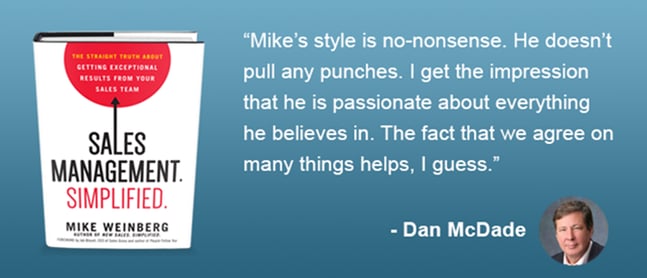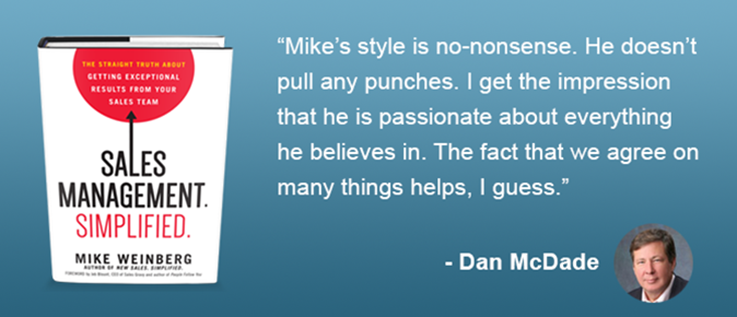
I recently had an opportunity to interview Mike Weinberg about his new book, “Sales Management. Simplified.” In part one of my follow-up blog post, I focused on the real stories about real sales managers and real executives we discussed in our conversation about real companies, big and small. In the second part of my post below, our discussion reveals a simple, practical sales management framework that any company can truly benefit from. Read on …
DM: The second half of the book is all about what you call a “very simple grid that helps sort out a myriad of potential sales issues into three main buckets: sales leadership and culture, talent management, and sales process.” You talk a lot about culture in the book and the importance of two kinds of meetings. First, there are one-on-one meetings that follow a well-thought out agenda with sales executives. Second, you stress the importance of the sales department meeting, which also follows a structured agenda. You write that, “Sales team meetings are critical to building a winning culture. They foster competition, cast vision, share best practices, challenge the team, facilitate sales or product training, build relationships between team members, and allow salespeople to see that they are part of something bigger than just themselves and their own territory. My old boss used to say that sales people do what you pay them to do, not what you want them to do. What do you think?
MW: I think this last question is a great summary of Part Two of the book! And I think your old boss was partially correct. Compensation matters–a lot. Compensation and complacency start with the same four letters and I’d argue that is not a coincidence. So if you see complacent sellers it’s not a bad idea to start by looking at the compensation plan. Having said that, comp is only one piece of the puzzle, and all the other pieces you touched on in your question are VERY powerful. When a salesperson’s heart is engaged, when she feels like she’s part of a winning team, when she knows she will face the music about her results every month, and when she gets to attend great sales team meetings that align, equip and energize the sales team, and she has a manager who masters the art of balancing encouraging her heart and kicking her ass—then we’ve got something special—and sustainable. Let’s be honest: doesn’t every executive crave a healthy, high-performance sales team that consistently hits its goals? I sure hope that’s the case, and it takes more than a rich compensation plan to create that kind of culture.
DM: I love the line from the book “none of us is smarter than all of us”. Tie that quote into the book for us.
MW: I took that quote from my mentor Donnie Williams (who I’m sure borrowed it from some leadership book). We would use that as it pertained to sales team meetings. Too often, sales meetings are boring and lame because the manager carries too much of the burden for planning and facilitating the meeting. Great things happen when the manager shares the load and gives away responsibility for leading parts of the meeting to reps. The other way that expression applies is when we do group brainstorming and strategy sessions on potential deals. If a salesperson has an opportunity stuck in the pipeline, bring that deal to the sales meeting and let your teammates go to town asking hard questions and offering ideas. None of us is as smart as all us. That is for sure.
DM: From your book: “I’m convinced that your three highest-value, highest-payoff activities as the sales leader are meeting 1:1 with your people, leading productive sales team meetings, and working in the field alongside members of your team.” Summarize your advice about these three activities for our readers:
MW: What could be higher-value than the benefits that accrue from those three activities? There is so much in those three specific chapters, instead of summarizing the content, which won’t do it justice, let me simply beg sales leaders to reevaluate their calendars and time commitments. So often I hear excuses that managers don’t have time to meet 1:1 with their people or that they can’t afford to spend time out in the field (on the phone with the inside sales team) with their people. Are you kidding me? That IS your job! These aren’t “nice to be able to” activities. These are the essentials. If you think you can lead your team by sending out strongly worded emails or sitting in corporate meetings, or worse, at your desk with your head buried in CRM screens, you’ve lost total sight of your roles as a leader and driver of revenue. I’m so passionate about this that I’ll send a signed copy of Sales Management. Simplified. to the first five people who read this article and write to me, mentioning my answer to this question.
DM: Finally, tell us about the “zookeeper” analogy as it relates to the points you make in the book about talent management.
MW: Too many companies deploy a one-size-fits-all approach to sales roles. Sure, some give lip service to the common hunter vs. farmer conundrum, but most aren’t willing to do the hard work to further define roles so their hunters can hunt while their zookeepers care for the animals. I use “zookeepers” intentionally because it’s a more stark contrast. Why does management think they can take someone who loves caretaking, feeding, nursing, cleaning, protecting the animals under their care and think for a minute that this same person is going to pick up a weapon and go out on the hunt? It’s crazy. Why even bother? Let people serve in their area of giftedness. We need great farmers and zookeepers caring for what’s been entrusted to them. And what would happen if we freed up the precious few sales hunters so they could maximize the amount of time they spent hunting? Why in the world would we task the hunter with preparing meals, serving guests and cleaning up the kitchen when there are other people who’d love to do that? Let the hunters hunt and the zookeepers zoo-keep. Imagine how much more fun everyone would have, how much more we’d sell, and how happy companies, clients, and salespeople would be.
Topics: Sales Process, B2B Sales





